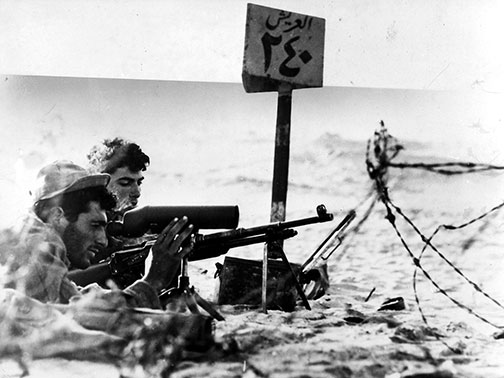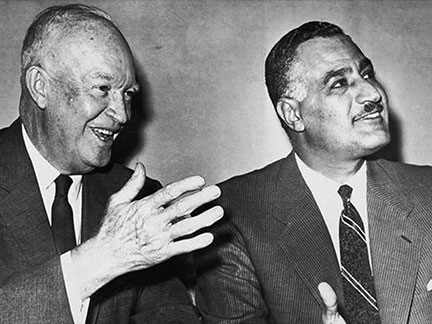Ike’s Bet and Nasser’s Vasser
In the middle of the last century, a grim, bilingual pun circulated among American Jews: Hitler fell into the vasser and came out a Nasser (vasser is water in Yiddish; nasser is wet). It’s hard to see the Egyptian leader as a Middle Eastern führer when one finds him, near the beginning of Michael Doran’s exciting new book, hanging out in the apartment of a junior American diplomat in Cairo, eating hot dogs and watching Hollywood movies. Yet even at that time, in 1953, the 34-year-old lieutenant colonel, behind-the-scenes leader of the military junta that had just taken charge in Egypt, appears to have been a master manipulator. He had no trouble convincing key American diplomats that Egypt would be a reliable ally, if only the United States would help it break free of the shackles of British imperialism.
This was something that America’s leaders were more than willing to do. Not only Secretary of State John Foster Dulles but President Eisenhower himself was eager to shatter, as the latter put it, “the obsolete Colonial mold” in order “to win adherents to Western aims.” Ike’s Gamble shows just how prepared the Eisenhower administration was to bully Great Britain into doing what Gamal Abdel Nasser wanted. It forced the British to abandon their huge military base in the Suez Canal Zone in exchange for nothing more than an Egyptian promise to let the West back in if there were a war. Eisenhower thought that this 1954 agreement had “laid the foundations for an Arab-Western alliance in the Cold War.” He soon learned, however, that he had made the British give much more than the West got and that, as Doran writes, “Nasser’s appetite only increased with eating.”

In 1953, even before the British-Egyptian deal had been struck, Dulles paid a visit to the Middle East that induced him to give up the “preconceived idea of making Egypt the key country in building the foundations for a military defense of the Middle East” against the Soviets. His subsequent attempt to construct a regional alliance in which Iraq was the principal Arab player outraged Nasser. When the Egyptian president railed against the American plan, Dulles belatedly recognized the depth of Nasser’s ambition to be the undisputed leader of the Arab world—and went about trying to satisfy it.
One way to do that was to let him take a bite out of Israel, a country that the anti-Zionist Dulles already regarded as an impediment to smooth relations with the Arab world. Together with Great Britain, the United States devised the “Alpha Plan,” which would have internationalized Jerusalem and required Israel to cede a large amount of territory in the Negev to Egypt and Jordan in exchange for peace. This proposal was far from good enough for Nasser, who was still too infuriated by the American plan for the region to pay any attention when he was first given a preview of it. By continuing to push the Alpha Plan, however, the Americans demonstrated that they were perfectly willing to strengthen “the regional actor who saw greatest advantage in perpetuating the conflict with Israel and who was also working to undermine the Western position in the Middle East.”
Things went from bad to worse. Nasser got closer and closer to the Soviet Union, while successfully deceiving many American bureaucrats into believing “that he, personally, was pro-Western but surrounded by more extreme elements” that he had to placate. Doran is at his best when he demonstrates precisely how Nasser manipulated senior CIA official Kermit Roosevelt and others into undermining Dulles’s first attempt to institute a more hardline policy toward Egypt. Convinced, the secretary of state offered, among other things, to help finance the Aswan High Dam, then still in its planning stages.
The courtship finally came to an end the following year when the Egyptian leader slapped Washington in the face by recognizing the People’s Republic of China. When the administration, responding in part to congressional pressure, rescinded the offer to help finance the dam, Nasser “countered,” as Doran puts it, “with the single greatest move of his career: nationalization of the Suez Canal,” brilliantly transforming “the disagreement with Dulles over the dam into a contest between Arab nationalism and European imperialism.”

Did things have to deteriorate to this point? Doran quickly dispenses with historians who have accused Dulles of unnecessarily offending Nasser. Above all, he writes, “the Dulles-lost-Nasser thesis ignores the utterly irresistible appeal to Nasser of the nationalization scheme,” which yielded “[j]ustice, glory, gold, and vengeance.” If there was any “single ‘triggering’ moment for the nationalization,” it was actually the evacuation of the last British soldiers from the Suez Canal Zone on June 13, 1956. “Why did Nasser nationalize the canal in July 1956?” Doran asks, “Because he could.”
Nasser’s move led, of course, to war. Doran retells the familiar story of the British-French-Israeli assault on Egypt three months later quickly. His interest is not the conflict itself but the American role in terminating it. Eisenhower, as he sees it, sided with the besieged Nasser not to win friends in the Middle East, as he had hoped a couple of years earlier, but to prevent creating more enemies, throughout “the whole Arab world.” To keep that from happening Eisenhower virtually forced the British to withdraw unconditionally from Egypt. Their quick compliance provides the occasion for one of Doran’s trademark witticisms: “The British Empire had come to its definitive end—first with a bang, then a whimper.” Less rapidly, but no less completely, Eisenhower forced the Israelis out of Sinai, though not before guaranteeing American support for Israel’s freedom of shipping through the Straits of Tiran and a UN buffer force between Israeli and Egyptian forces in Gaza.
Doran’s sketch of immediately ensuing developments in the Middle East demonstrates just how little America received from Nasser for its diplomatic endeavors. The Egyptian leader’s continuing efforts—some successful, some not—to subvert American allies in the region led Eisenhower and Dulles to re-evaluate their whole stance toward the Arab world. By 1958 they understood how senseless it was to treat Nasser as if he were the leader of the entire Arab nationalist movement and explicitly supported a strategy that “called for using the innately fissiparous character of Arab politics to weaken Nasser’s power indirectly.” They had, in short, “discarded the basic assumptions about the Middle East that had led them to drive the British, French, and Israelis out of Egypt in 1956.”
Eisenhower now saw Israel in a different light too. Building on the decades-old but insufficiently known work of Israeli scholar Abraham Ben-Zvi, Doran highlights the degree to which the president had come to think of the Jewish state as an asset in defending American interests in the Middle East. After he left office, Doran shows, Eisenhower regretted his dalliance with Nasser. “You know, Max,” he told the prominent American Jew and Republican fundraiser Max Fisher, “looking back at Suez, I regret what I did . . . I never should have pressured Israel to evacuate the Sinai.” And in 1988 Richard Nixon divulged that Eisenhower had told him that he considered Suez to have been “his major foreign policy mistake.”
“If the Ike of 1958 had appeared earlier,” Doran asks toward the end of the book, “would he have really made a difference?” This is an excellent question, but I wish that he had preceded it with a couple of others: What would have happened if Dulles had determined on his 1953 visit to the Middle East that Egypt, as the most populous and strategically located country in the Arab world, should not be subordinated to Iraq but simply had to be the lynchpin of any regional defense organization? Could the hot dog-munching, movie-going young colonel have become our man if we had tried harder to accommodate him at the very outset?
These are questions that Doran doesn’t ask, and what he does tell us early in his book about Nasser’s articulation of a neutralist and pan-Arab outlook in 1954 does not quite suffice to answer them. There is, in fact, little reason to think that anything the United States could have done the previous year would have altered things. But the argument of Doran’s book would have been stronger if he had provided his readers with a more complete view of Nasser’s fully shaped anti-imperialistic outlook, even before he came into contact with American officials, and shown that his views were always incompatible with any participation in a Middle Eastern coalition orchestrated by them.
The journey that Doran actually does take into the land of “what if” does give us a glimpse of a possible mid-century Middle East in which the United States has turned Nasser into a loser instead of allowing him to become a winner. It is one in which Eisenhower makes it possible for the British, French, and Israelis to refuse to evacuate Egyptian territory until Nasser makes concessions that would not only “have prevented Nasser from plausibly claiming that he had won an historic victory,” but might also have prevented the development of the conditions that led to the outbreak of the Six-Day War. It is one, moreover, in which forces inspired by Nasser would not dare to overthrow the pro-U.S. Hashemite regime in Iraq.
Doran is too sophisticated to think that a sounder American policy would necessarily have guaranteed that things would turn out this way. A hard-headed strategic thinker, he is not trying to make us dream about what might have been but teach us—or, more precisely, the policymakers who will and should read his book—how to think about fundamentally implacable and dishonest adversaries with whom the United States has to deal. (Interested readers may want to reread his recent and already prescient criticisms of President Obama’s Iran deal with this history of Eisenhower’s failed gamble in mind.) Doran’s diplomatic lesson is clear (if hard to follow): Don’t let them con you. Even those who might quarrel with his analysis of the past ought to see the wisdom in such advice.
Suggested Reading

The Integralists and Us
A Jewish colleague once asked Harvard Law Professor Adrian Vermeule, “In a fully Catholic polity, the sort you would like to bring about, what would happen to me, a Jew”? “Nothing bad,” Vermeule replied. OK, let’s see.
Is Repentance Possible?
And should we add a confession on Yom Kippur “for the sin of opening browser windows of distraction”? On Aristotle’s akrasia and Maimonides’s teshuvah.
The Wages of Criticism
The great 18th-century talmudist Rabbi Aryeh Leib Ginsburg never whitewashed his disagreements with other scholars, claiming that most "ruined good paper and ink and embarrassed the Torah." According to a popular rabbinic legend, his downfall came when, in an act of cutting vengeance, the books he had criticized came toppling upon him.

Haredim and COVID-19: Tenants or Landlords?
Between rabbinic rulings and public policy: a response from Daniel Goldman and Yossi Shain and a rejoinder from Yehoshua Pfeffer.
Comments
You must log in to comment Log In